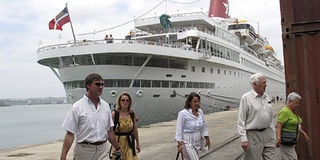Tourism takes a dip as recession bites

Tourists from the Norwegian cruise ship Black Watch Nassau disembark at the Mombasa port last year. The number of visitors coming to the country has gone down partly due to recession and piracy.
Photo/FILE
What you need to know:
- Number of visitors falls with limited spending among those who show up
By January and February last year, the tourism industry had earned the exchequer a record Sh65 billion, bookings were streaming in with hotels recording over 80 per cent bed occupancy and heading upwards. Things could only look better.
Currently, occupancy is averaging between 50 and 60 per cent, with bookings headed downwards.
According to industry players, comparison can only be drawn along the 2007 lines, as last year’s poor performance was as a result of the post-election violence.
Source market
Due to economic recession in Europe, there are minimal bookings coming in this year compared to other periods.
People in the Kenyan main source markets of United Kingdom, France, Germany, Switzerland and Italy are thinking of how to get out of the financial crisis or pay their mortgages than how to spend money on a holiday, according to industry sources.
Mombasa and Coast Tourist Association (MCTA) chairman Kuldip Sondhi says although there have not been cancellations, the industry is not receiving any new bookings while tourists on holiday are trying to cut costs.
As employers in Europe increase insurance premiums deductions for health cover on their employees, and with the economic downturn making it difficult for employers to subsidise, plus layoffs being the order of the day, Europeans are having to choose between keeping their health covers and saving for a holiday.
Those coming in have little to spend, and according to Mr Sondhi, the all-inclusive packages have become their favourite.
These arrangements provide for payment of accommodation, safaris and other ground services being fully done at the country of departure.
Bare minimum
This means that despite tourists’ presence, their expenditure on other services is too limited that little or no money is tricking down into the economy.
“They are keeping expenses to the bare minimum; the curio dealer down the chain is not benefiting from their presence,” says Mr Sondhi, adding that on average, bookings are at 65 per cent.
Mr Sondhi says there are more tourists from eastern European countries of Poland and Czechoslovakia than from traditional markets of United Kingdom and Germany because of the recession.
“Bookings from those markets have gone down by 30 per cent while those of the former have doubled,” he says.
With eastern Europe currently showing signs of growth, Mr Sondhi, who also owns Reef Beach Hotel on the North Coast says the Kenya Tourism Board (KTB) should aim its marketing campaigns in that direction.
According to the Kenya Association of Tour Operators (Kato) Mombasa branch chairperson, Ms Tasneem Adamji, the industry is faced with challenging times because the low season will set in earlier than expected.
“Travellers with money to spend are thinking of how best to spend it. We are considering the best packages we can offer because we are faced with stiff competition,” she says.
“Already, Thailand has come up with very attractive three-month special packages,” added Ms Adamji, who is also the managing director of African Quest Safaris, a tour operator.
But despite the sad picture, cruise tourism has been doing pretty well since the tours are pre-booked for up to two years.
Those coming in on cruise ships paid for their trips over a year ago. During this cruise season, Mombasa is expected to receive 18 cruise ships.
“Most tourists taking a cruise holiday are retirees who have not been affected much by the mortgage problems in Europe,” said Mr Anthony Chege, general manager Abercrombie & Kent, a tour company that handles most ground arrangements for cruises calling at the Mombasa Port.
In fact, Mr Chege added, it is piracy on the Indian Ocean that has affected cruise tourism than the recession. Increased piracy in the Gulf of Aden has not only pushed insurance and freight costs high, but also become a threat to cruise liners.
Recently, pirates unsuccessfully pursued a cruise ship with intentions of capturing it. Despite the potential of the cruise industry in Kenya, very little investment has been done to improve earnings from the sector, according to Mr Sondhi.
“We are missing a terminal with facilities for freshening up and restaurants which would mean big business for the industry,” he said in an earlier interview.




